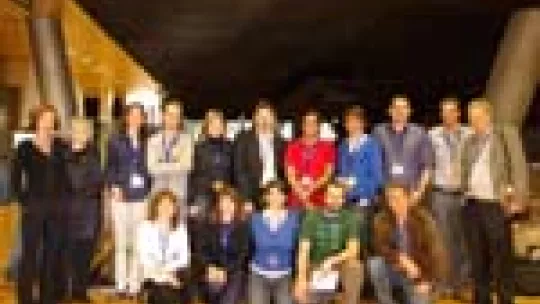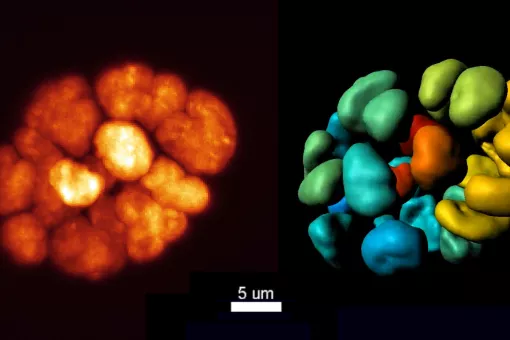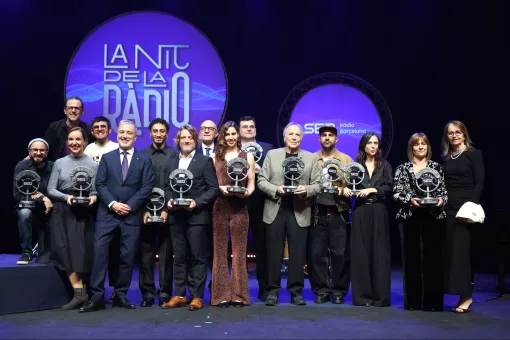Images
The Israeli scientist and another seven scientists from prestigious international centres in biomedical research come together in a pioneering initiative in Spain.
Winner of the 2009 Nobel Prize in Chemistry, Ada Yonath, is participating today and tomorrow in Barcelona in the 1st PhD Student Symposium, entitled “The Architecture of Life”, a pioneering initiative in Spain organized entirely by young researchers at the Institute for Research in Biomedicine (IRB Barcelona). The Israeli scientist from the Weizmann Institute, who will give a scientific talk this afternoon on the complexity of the ribosome to the 150 European PhD students registered in the symposium, did no hesitate to accept the invitation. “I have always supported young scientists and I accepted the invitation the very day I received it. In addition, the event is in Barcelona, an attractive city in terms of science. In recent years, Spain has taken a significant step forward in biomedical research”, explained the scientist in a press conference at the Barcelona CosmoCaixa, the venue of the symposium.
Yonath has recently won the 2009 Nobel Prize in Chemistry, which is shared with Thomas A. Steitz and Venkatraman Ramakrishnan, for revealing the structure of the ribosome, the molecular machinery that produces proteins from DNA. Yonath continues to devote her research effort to ribosomes, knowledge that is highly useful for the development of antibiotics, as these attack bacterial ribosomes. “We are searching for new approaches to attack bacterial ribosomes as there is resistance to many current drugs. We have obtained promising results in the lab that could lead us to develop new antibiotics in the near future”. The scientist goes on, “we continue to acquire new knowledge which sooner or later will benefit mankind. That is what science is about”. Regarding advice for new generations on scientific work, Yonath is sure of one thing. “In my opinion, the one reason that drives a person to devote himself/herself to science is to satisfy curiosity. Science is a synonym of pleasure, it is intense and it is a good way to generate new knowledge, which allows humanity to progress”.
150 students brought together in Barcelona
“We are really excited about the participation of a Nobel Prize winner such as Ada Yonath in our first symposium” says Diana Martínez, a PhD student in Structural Biology at IRB Barcelona who contacted the scientist. “We invited her in recognition of her extraordinary scientific achievement in the resolution of fundamental structures for life, a task that has now been made public thanks to the Nobel Prize. Her acceptance of our invitation was a pleasant surprise. We are very much looking forward to hearing about the personal and professional journey she has made and which has culminated in the award of the highest scientific accolade”. One of the sessions of the symposium which the 150 participants are most looking forward to is the plenary session to be held on Monday on “the Globalization of Science”. The eight international guest speakers will share the details of their professional trajectories in different institutes throughout the world with the students and will deliberate on the highs and lows of a scientific career, a long trajectory that can take the scientist around the world.
The symposium “The Architecture of Life” explores the present studies on how life is built, from the questions related to DNA, RNA and proteins, to how tissues and complete organisms develop, both in healthy and diseased states. The talks by the eight guest speakers will be alternated with eight brief presentations by selected students and poster sessions.
Duarte Mesquita, a Portuguese PhD student in Developmental Biology at IRB Barcelona and member of the Organising Committee, explains, “it has been a great challenge to choose a theme that covers the interests and five research fields of IRB Barcelona and at the same time touches on all the aspects that intrigue students in biomedicine throughout Europe. The response has been fantastic”.
The Organising Committee of the symposium, which comprises eight PhD students from different scientific programmes at IRB Barcelona and of diverse nationalities, shares enthusiasm and passion for science. The initiative of the Ist PhD Symposium fits one of the major missions established by IRB Barcelona, namely the training of future scientific leaders in an international, stimulating and competitive world. The 27 laboratories currently host 152 PhD students from 25 countries, and 95 post-docs, 40% of whom are non-Spanish nationals. IRB Barcelona is one of the four institutes in Spain that receives the prestigious “la Caixa” fellowships for PhD students, which attract the most promising candidates from around the world.
About IRB Barcelona
The Institute for Research in Biomedicine (IRB Barcelona) pursues a society free of disease. To this end, it conducts multidisciplinary research of excellence to cure cancer and other diseases linked to ageing. It establishes technology transfer agreements with the pharmaceutical industry and major hospitals to bring research results closer to society, and organises a range of science outreach activities to engage the public in an open dialogue. IRB Barcelona is an international centre that hosts 400 researchers and more than 30 nationalities. Recognised as a Severo Ochoa Centre of Excellence since 2011, IRB Barcelona is a CERCA centre and member of the Barcelona Institute of Science and Technology (BIST).








